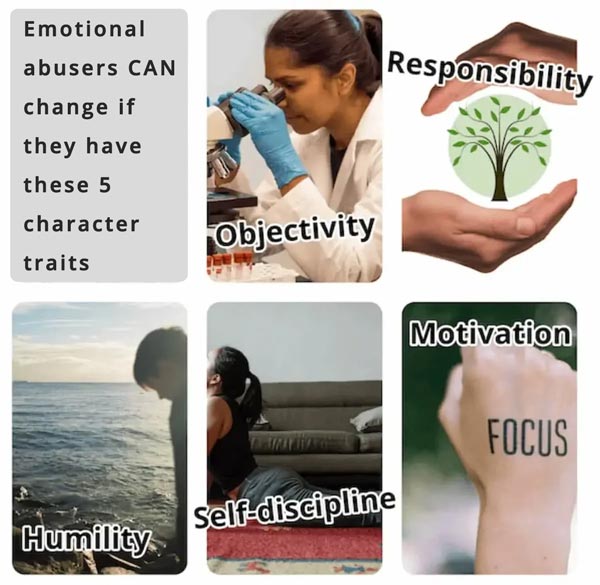Know the Scientific Signs of Mental Abuse

Mental and emotional abuse is wrong!
The first step to freeing yourself from being abused is to know what the mental abuse signs are. Knowing what the mental abuse signs are, is your first step to stopping it. Without awareness of what emotional and mental abuse is, you will likely continue to be a victim!
Know, that if you are being emotionally or mentally abused it is not your fault. Being treated with respect, kindness, and care is a human right! No person has a right to be cruel toward another.
Note: In this article, emotional abuse and mental abuse describe the same toxic relationship dynamic.
If you are reading this, you are probably wondering if you or someone you love, is suffering from emotional or mental abuse. Both emotional and mental abuse refer to cruel behavior deliberately directed toward another person.
Often it is difficult to tell if someone is being emotionaly and mentally abused. They have no visible signs that they have been injured. Their wounds are hidden deep within. This is why it is important to know the signs of mental abuse.
Emotional and mental abuse is corrosive. If you are being abused, it will erode your confidence over time, make you fearful, and leave you feeling isolated.
Here are the 14 Scientific Signs of Mental Abuse in a Relationship:
In ALL mentally abusive relationships, the abuser has the clear intention to humiliate, dominate, and shame his or her partner with the single aim of controlling him or her.
A deliberate effort to control one’s partner is a necessary criterion to qualify the relationship as being abusive.
Sometimes an individual accuses his or her partner of ‘abuse’ to hurt or to express how they feel. However, using the word ‘abuse’ is not sufficient to actually make a determination if a person is an abuser.
Abuse is defined as the intent to control one’s partner at all times and in all ways.
It is easy to mistake relationship anger for abuse. Even though anger hurts and is frightening, without the intent to control the other person, it is not abuse!
A sustained effort to control one’s partner is what defines the behavior as abusive.
Relationship fighting is not automatically an act of abuse.
Aggression is the most common means that an abuser uses to gain the upper hand — to control.
The emotional or mental abuser uses all types of aggressive behavior such as anger, threats, destroying or withholding items, and harsh criticism to achieve control.
The abuser’s sustained aggressive attacking behavior eventually wears down his or her partner to the point where the abuser has full control over the relationship.
For example, Donald warns his wife Sharon that she must be ‘on time’ and ‘not late’ when he wants to leave on their trip if she is to avoid punishing consequences.
Donald is training his wife to ‘do what he says’ — to accept his authority.
This is emotional and mental abuse.
An abuser believes that he or she is entitled to use his or her strength to control the relationship.
Having power, like a lion who is the king of the jungle, gives one the right to dominate.
A loud voice, a willingness to be aggressive and inflict pain, having control over the finances, being smarter, being sexually aggressive, or being a man are often seen as proof of power.
For example, Michael controls the money in the family. He only gives his wife, Susan the amount of money HE feels is reasonable.
Susan’s opinion does not matter. She has no entitlement since she is dependent on him — she is weak.
In Michael’s mind, he is the strong one since he controls the money.
This is emotional and mental abuse.
An emotionally and mentally abusive person is prepared to go as far as necessary to establish his or her dominance — normal behavior limits do not apply.
The emotional abuser may take away his or her partner’s car keys, threaten to take away the children, assert that his or her partner is ‘crazy’ and needs to be committed to a psychiatric ward, and use other psychologically abusive mind control games such as gaslighting (confusing the truth) and passive-aggressive anger.
The abuser’s intent is to weaken his or her partner so he or she can be easily dominated.
For example, Tina threatens her husband Tom that if he doesn’t help her with chores around the house, she will leave him and he will lose his contact with their children.
This is emotional and mental abuse.
An emotionally abusive person is persistent and does not give up until his or her goal of control has been achieved.
It is this dogged determination that shows the true intent of the abuser, which is to dominate and control.
For example, Karen would wake her husband Eric up in the middle of the night and repeatedly tell him how disappointed she was in his efforts to earn money for the family.
These ‘attacks’ often went on for hours and could be repeated for several consecutive nights.
Eric’s pleas that he needed to sleep to be able to function at work the next day went unheeded.
This is emotional and mental abuse.
An emotionally abusive person is ruthless in his or her efforts to dominate and maintain control.
Remarks made repetitively to the victim, such as ‘you spend too much money, are romantically interested in other people outside the marriage, talk to parents too much,’ are used to erode the victim’s feelings of security and confidence.
Comments such as these from the emotional abuser make his or her partner an easier prey to dominate and control.
For example, Tony can be irritable. During dinner, he snapped at Sean, his nine-year-old son, and told him to put away his phone.
Tony’s wife, Melinda immediately chastised him for his disciplining their son.
Later in the evening, Melinda yelled at Tony and told him that he was a ‘bad father.’
The next day, Melinda sent Tony a barrage of text messages insisting he take a parenting class.
Melinda was relentless in her attacks on Tony.
This is emotional and mental abuse.
A mentally abusive person uses threats, intimidation, and bodily harm, and treats his or her partner as an object to be manipulated.
The abuser denies the right of a partner to assert his or her will.
Only the abuser’s will matters, not his or her partner’s will.
For example, Tim was a successful lawyer. His clients paid top dollar to get his advice about how to solve their legal matters, and his secretaries did his bidding.
When Tim came home, he made it clear to his wife Barbra, that she was to follow his orders.
She was not to question him, oppose him, or negotiate with him.
When Barbra did challenge her husband, he would respond with threats to divorce her, threaten to take away the children, threaten to tell people what a horrible person she was, and abandon her and leave her destitute.
This is emotional and mental abuse.
An emotionally abusive person is negligent in his or her care of a partner.
The emotional abuser does not care about a partner’s emotional, physical, spiritual, or medical needs.
For example, Sam had a neurological disorder. Over time, he lost his mobility and became confined to a wheelchair.
His wife, Amanda neglected his needs.
She abandoned him to care for himself.
Often, after work instead of going home and attending to the needs of her husband, Amanda would go out with coworkers to enjoy the evening in restaurants and bars.
Amanda had no interest in what Sam’s doctor said about his illness or his prognosis. She was only interested in herself.
This is emotional and mental abuse.
An emotionally abusive partner rejects taking responsibility for harming his or her partner.
An abusive partner has no interest in fixing his or her past mistakes since he or she is never wrong.
For example, Charlie loved fast cars.
Charlie also loved alcohol.
Often he would combine the two.
Maria, his wife, pleaded with him not to drink and drive, but to no avail.
Charlie just ‘blew her off’ and continued doing what he loved — drinking and driving fast.
Maria felt frightened and controlled.
Charlie once crashed into a highway barrier and ruined the car. Fortunately, no one was injured.
When Marie asserted the accident was caused by Charlie’s speeding and drinking, he turned it around and blamed her for the accident, saying she nagged him so much that this caused him to become distracted (gaslighting).
This is emotional and mental abuse.
A mentally abusive person makes unilateral decisions, uses deceptive communication, and is not concerned about how his or her decisions impact others.
The emotional or mental abuser operates like a king and is not accountable to anyone.
Benevolence or harsh decrees are the abuser’s right to bestow or impose. No one else has that authority.
For example, Harry did not like his job.
His solution was simple. He went and got another job in a different state.
Without any discussion, he uprooted his wife and their two children and relocated them without considering their needs.
Margaret, Harry’s wife, left behind her aging parents and her three siblings.
Adjusting to life in a new place was daunting, and she felt guilty leaving her parents.
Within a few months, Margaret became depressed.
Harry responded to Margaret’s adjustment difficulties by claiming she was not a supportive wife.
This is emotional and mental abuse.
An emotional abuser does not care about the individual needs, feelings, and opinions of others.
Being sensitive is considered a weakness.
Being sensitive proves a person is inferior.
Being tough, confrontational, and strong entitles the abuser to control his or her sensitive and weak partner.
For example, Chantel decided one day to become a vegetarian.
Her husband, Mark wanted to eat a traditional Western diet, which includes eating meat.
Without any discussion or consensus, Chantel stopped cooking meat and instead prepared complex vegetarian meals.
Mark protested and explained that this ‘new food’ gave him an upset stomach and made it difficult for him to sleep at night.
Chantel responded by telling Mark that eating meat was unhealthy and she didn’t want to eat it. She would not cook, nor serve it either.
Chantel accused Mark of being ‘overly sensitive.’
Chantel asserted her ‘right’ to cook whatever she wanted, and if Mark didn’t like it, he could eat in a restaurant.
This is emotional and mental abuse.
As a senior member of the family, an emotionally abusive person does not acknowledge his or her obligations and responsibilities.
Rather, to the mental abuser what is most important is his or her right to do whatever he or she pleases.
The abusive person is not willing to form a team with his or her partner.
The emotional abuser creates a relationship whereby he or she is autonomous and accountable to no one.
For example, Jacqueline was pregnant.
She felt nauseous, had difficulty bending over, and had difficulty lifting heavy objects.
All of this made no difference to her husband, Peter.
Whatever her responsibilities were before pregnancy, in his mind, they were the same now.
Peter would not help her bring in the groceries from the car or pick up anything from the floor.
Peter was not going to limit the things he wanted to do to help Jacqueline, his wife.
When Jacqueline asked Peter to stay home and help her, he went to the golf course.
This is emotional and mental abuse.
An emotional abuser is critical of his or her partner.
Being critical is a way of maintaining superiority which then justifies control.
Whatever the abuser’s partner does, it is subject to questioning, scrutiny, and frequent challenges.
Often anger accompanies ‘harsh judgments.’
For example, Andy lost his job. He is now in his late 50s, and at this age, it is difficult to find a new one.
His girlfriend Dawn, has no compassion for him.
She demands that he provide her with money and is indifferent to the fact that he is depressed and anxious.
Dawn blames Andy for losing his job, and she blames him for not finding a new one. She accuses him of being a bad partner, insisting he is a loser.
Every day, Dawn finds one way or another to attack her emotionally wounded partner.
This is emotional and mental abuse.
An emotionally abusive person feels entitled to have and do whatever he or she desires.
The abuser’s narcissism will not allow him or her to credit the contributions their partner makes to the family. Thus, the abuser is entitled to everything.
And since the mental abuser is entitled to ‘everything,’ he or she sees no reason to ever compromise.
Simply, in the mind of the abuser, he or she should get everything he or she wants. Being selfish is his or her right!
For example, Kurt loves sports. He loves playing, going to sporting events, and watching sports on TV.
Everyone in the family has to accommodate Kurt’s ‘love of sports.’
When it is a Sunday, no one is allowed in the family room while Kurt watches a sporting event.
He is indifferent to his wife Becky’s pleas to participate in family activities.
Simply, Kurt tells her that he works hard all week, that he is entitled to relax, and that everyone else should ‘just get a life’ and leave him alone.
The fact that his wife Becky also works makes no difference to him.
This is emotional and mental abuse.
An emotionally abusive person rejects the needs, rights, and limitations of his or her partner.
When the victim protests that his or her partner is ‘unfair or unreasonable,’ these protests are also rejected.
The mental abuser, who controls the relationship, rejects any demands for fairness or justice.
To the abuser, the rights of others are not important.
For example, Thomas had agreed to give the children baths nightly.
Sharon, his wife, appreciated Thomas helping with the children.
One of Thomas’s friends managed to get exclusive box seat tickets to a major sporting event. He invited Thomas to join him.
Attending the sporting event meant that Thomas would miss one night helping Sharon with the children.
Sharon rejected Thomas’s request to be excused from child care so he could attend the sporting event.
He tried to reason with her.
Thomas proposed that he would compensate her by doing extra childcare on other days.
Sharon rejected all of her husband’s requests and his proposed compromises.
She insisted that he be home and simply miss the event he wanted to attend.
She threatened him that if he went to the event, she and the children would be gone when he returned.
This is emotional and mental abuse.
Learn more about the 14 signs of emotional and mental abuse:
[The 14 Signs of Emotional Abuse are adapted from INTIMATE JUSTICE: CONFRONTING ISSUES OF ACCOUNTABILITY, RESPECT, AND FREEDOM IN TREATMENT FOR ABUSE AND VIOLENCE, The Journal of Marital and Family Therapy.]
You have read the 14 mental abuse signs and you have concluded that you are being abused.
Now you need to take some decisive action to free yourself from your abusive relationship.
Yes, you are in a difficult situation. At the same time, there are ways to make your life and relationship with your partner better.
There is hope!
Many emotional and mental abusers can change for the better.
Are you in an emotionally mentaly abusive relationship? Take our FREE test and find out! Immediate results, no email required. ONE MILLION INDIVIDUALS have already taken this scientific-based Emotional Abuse Test!



